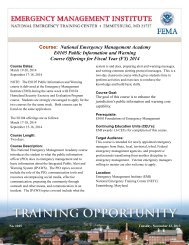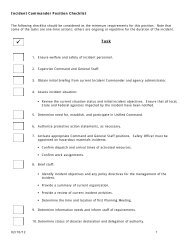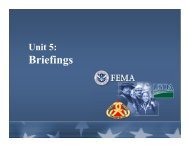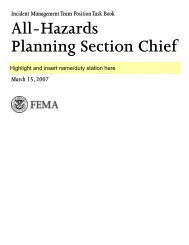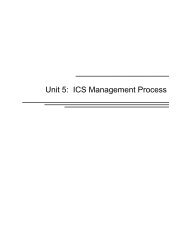enrollment for emi courses - Emergency Management Institute ...
enrollment for emi courses - Emergency Management Institute ...
enrollment for emi courses - Emergency Management Institute ...
You also want an ePaper? Increase the reach of your titles
YUMPU automatically turns print PDFs into web optimized ePapers that Google loves.
fEma/fEDEral partnErs<br />
cOursEs—DIsastEr<br />
OpEratIOns & rEcOvEry<br />
Prerequisites:<br />
EmE r g E n c y ma n a g E m E n t In s t I t u t E • 2010-2011 • ca t a l o g of co u r s E s<br />
Required: IS 7, A Citizen’s Guide to Disaster Assistance;<br />
IS 100.a, Introduction to the Incident Command System<br />
(ICS), ICS-100; IS 101, Deployment Basics: Federal Disaster<br />
Work<strong>for</strong>ce Readiness; IS 200.a, Incident Command System<br />
(ICS) <strong>for</strong> Single Resources and Initial Action Incidents, ICS-<br />
200; IS 230.a, Fundamentals of <strong>Emergency</strong> <strong>Management</strong>;<br />
IS 244, Developing and Managing Volunteers; IS 288, The<br />
Role of Voluntary Agencies in <strong>Emergency</strong> <strong>Management</strong>; IS<br />
700.a, National Incident <strong>Management</strong> System (NIMS), An<br />
Introduction; and IS 800.b, National Response Framework<br />
(NRF), An Introduction.<br />
Course Length: 5 days<br />
CEUs: 2.9<br />
Disaster field Operations management<br />
(DfOm) (E292)<br />
This course provides FEMA disaster managers<br />
with the knowledge, skills, and abilities needed to<br />
establish and maintain effective coordination among<br />
all elements in a Joint Field Office (JFO) or disaster<br />
operations support facility. All participants must have<br />
a strong working knowledge of FEMA programs and<br />
be capable of making a significant contribution to<br />
their organization’s disaster response, recovery, and<br />
mitigation capabilities.<br />
Selection Criteria: FEMA Headquarters, Regional, or<br />
NSPC staff, GS-12 or higher, who will function as<br />
managers in a Joint Field Office or disaster operations<br />
support facility.<br />
Prerequisites:<br />
Recommended: E/L269, Managing FEMA Staff on Disaster<br />
Operations; IS 101, Deployment Basics: Federal Disaster<br />
Work<strong>for</strong>ce Readiness; and IS 800.b, National Response<br />
Framework (NRF), An Introduction.<br />
Course Length: 4 days<br />
CEUs: 2.9<br />
FEd E r A L Em E r g E N C y mA N A g E m E N T Ag E N C y 110<br />
Disaster field training Operations (DftO)<br />
training unit leader (E294)<br />
This course provides individuals with the ability to<br />
serve as supervisors, managers, and leaders of a<br />
DFTO in a disaster field setting. The course provides<br />
an introduction to the purpose and use of training<br />
evaluations and the validation of the evaluation<br />
instruments.<br />
Selection Criteria: Experienced DFTO Cadre members<br />
designated to potentially become training unit<br />
leaders; Federal employees from FEMA Regions<br />
and Headquarters.<br />
Prerequisites:<br />
Recommended: E283, Disaster Field Training Operations<br />
(DFTO) Orientation.<br />
Course Length: 4 days<br />
CEUs: 2.9<br />
Intermediate Incident command system<br />
(Ics) <strong>for</strong> Expanding Incidents, Ics-300<br />
(E/l300)<br />
ICS-300 provides training on and resources <strong>for</strong><br />
personnel who require advanced application of<br />
the Incident Command System (ICS). This course<br />
expands upon in<strong>for</strong>mation covered in the ICS-100<br />
and ICS-200 <strong>courses</strong>.<br />
The course objectives are as follows:<br />
• Describe how the NIMS Command and<br />
<strong>Management</strong> component supports the<br />
management of expanding incidents.<br />
• Describe the incident/event management process<br />
<strong>for</strong> supervisors and expanding incidents as<br />
prescribed by the Incident Command System (ICS).<br />
• Implement the incident management process on<br />
a simulated Type 3 incident.<br />
• Develop an Incident Action Plan <strong>for</strong> a simulated<br />
incident.



